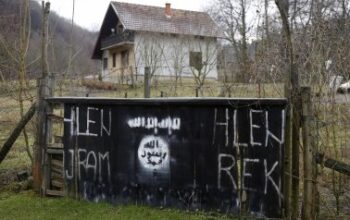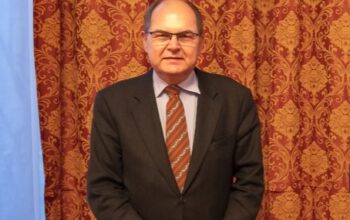BiH Institutions are failing to protect BiH from terrorism and refusing to confront the roots of Islamic extremism in the country.
On April 27, a man believed to be affiliated with the Wahhabi movement attacked the police station in Zvornik, Republika Srpska, during a shift change. Shouting, “Allahu Akbar,” he opened fire on RS police officers using two automatic weapons. He killed Officer Dragan Djuric and wounded two other officers. This attack—directed, importantly, at one of the institutions responsible for the security and safety of RS citizens—did not come out of nowhere. Rather, it was a product of the long history of jihadism in BiH, and the culmination of a decades-old relationship between Bosniak political figures and international jihadist networks.
At least one of the men arrested in connection with the attack had recently returned from Syria, where he allegedly fought with forces of so-called Islamic State (IS). BiH is Europe’s largest per-capita contributor of fighters to ISIS. This is no accident, but rather a product of Bosnia’s place in the history of the global jihadist movement.
In the 1980s, hundreds of men from Southwest Asia and North Africa were recruited by jihadist leaders to fight against the Soviet Union in Afghanistan. Battle-hardened, newly expert in guerilla tactics, and radicalized by an ideology that blended religious fanaticism with militant reactionary politics, these men returned to their home countries to wage war against local authorities. Some of them formed new terrorist networks, including Osama bin Laden’s al-Qaeda Organization. They became, in essence, an international army in need of a new war.
The civil war in BiH in the early 1990s provided these fighters with a new battleground. They were welcomed by many Bosniak leaders, including several who remain in positions of power today. The foreign fighters and their local recruits formed the El Mujahid Detachment, which routinely tortured and beheaded Serb prisoners during the war. A 1996 article in The Guardian described the mujahidin as “a kind of paramilitary guard” for the SDA—currently the senior party in the Federation and BiH coalitions—and noted their especially close relationship with Šemsudin Mehmedović, who is now an SDA member of the Joint Committee on Defense and Security in the BiH Parliamentary Assembly. Following the war, many of the mujahidin remained in BiH and were given Bosnian passports. Funds from the embassies of Saudi Arabia and Iran helped to support them in their new home.
Their influence has since been felt. In 2010, jihadi terrorists bombed a police headquarters in the town of Bugojno in central Bosnia, killing police officer Tarik Jubuskic and injuring six others. In October 2011, another terrorist armed with an AK-47 and hand grenades attacked the U.S. Embassy in Sarajevo, hitting it with 105 bullets. Bosnian citizens now fighting for the Islamic State, just like the “Afghan Arabs” before them, will be returning home even more dangerous than when they left. According to press accounts, Federation and BiH security officials are fully aware of local fighters going to and returning from Syria, but do little or nothing to prevent the flow of recruits, or deal with those who return.
Moreover, instead of confronting the roots of Islamic extremism in BiH, BiH-level agencies are protecting prominent war crimes suspects linked to the El Mujahid. BiH institutions have failed to prosecute a single member of the El Mujahid—or a single ARBiH officer with responsibility over the El Mujahid—for the unit’s many murders of Serbs. In addition, the BiH Prosecutor’s Office recently decided not even to investigate new evidence linking the SDA current president of the BiH House of Representatives to war crimes by the El Mujahid. The new evidence submitted by a former member of the Bosniak SDA party to the BiH Prosecutor’s Office included thousands of pages of evidence of war crimes against Serbs. This includes evidence that Šefik Džaferović, the current president of the BiH House of Representatives and vice president of the SDA, was complicit in El Mujahid atrocities.
BiH authorities have a clear duty to protect all citizens. They should increase vigilance to stop terrorist recruitment and prevent those who have gone to Iraq and Syria from bringing terror home. At the same time, BiH institutions must stop protecting prominent Bosniaks linked to the El Mujahid and seek justice for the unit’s grisly crimes.


